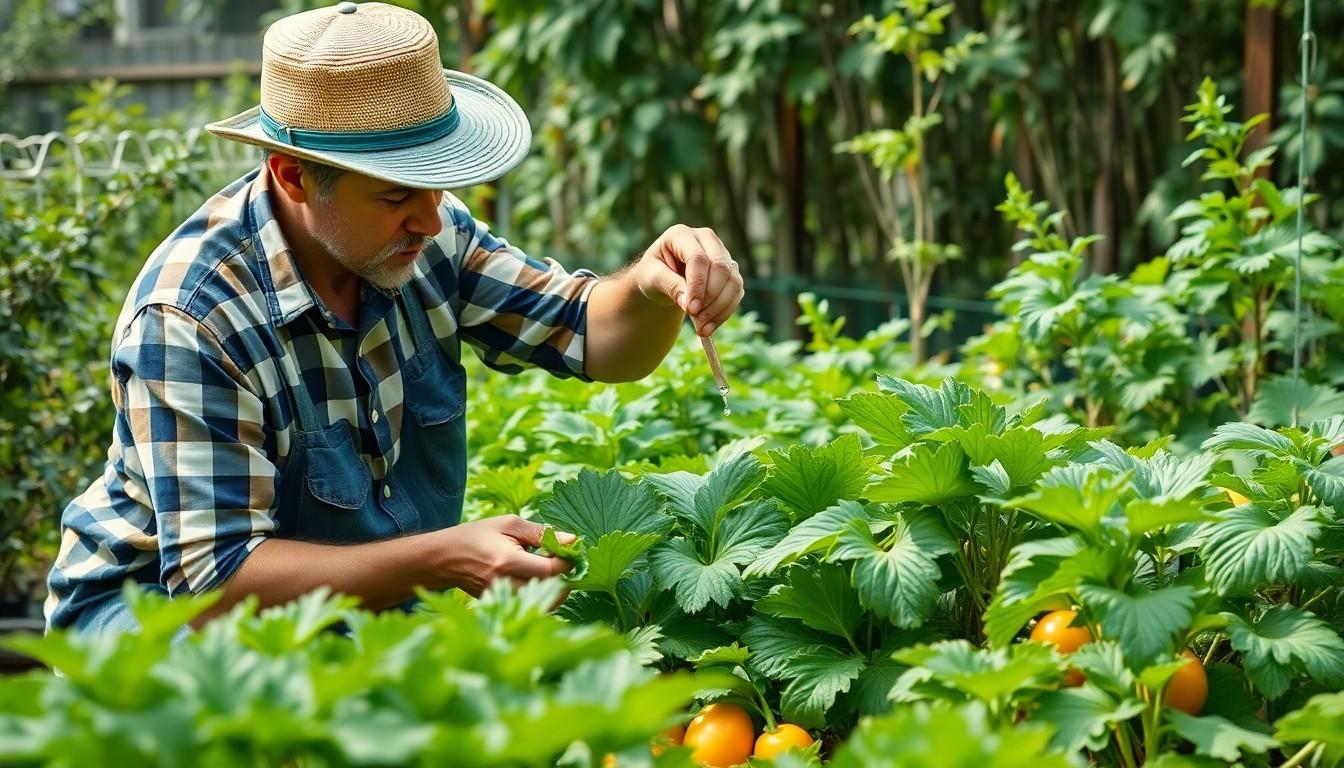Phone:
(701)814-6992
Physical address:
6296 Donnelly Plaza
Ratkeville, Bahamas.

Imagine a vegetable garden thriving with lush greens, free from pests and diseases. Sounds like a dream, right? Well, it’s time to wake up and smell the neem oil! This natural wonder isn’t just for your skincare routine; it’s a gardener’s secret weapon. Packed with powerful properties, neem oil offers a safe and effective way to protect your precious plants without turning your garden into a chemical lab.
Neem oil originates from the seeds of the neem tree, scientifically known as Azadirachta indica. This oil contains several compounds that offer numerous benefits for vegetable gardens. Its primary component, azadirachtin, disrupts the life cycle of pests, making it harder for them to thrive.
In addition to pest control, neem oil provides antifungal properties that protect plants from diseases. Applying neem oil can help prevent common issues like powdery mildew and root rot. Regular use leads to healthier plants, promoting better overall growth.
Gardeners appreciate neem oil’s low toxicity. Unlike synthetic pesticides, it does not harm beneficial insects like bees and ladybugs. This makes neem oil a safer choice for those looking to maintain ecological balance in their gardens.
Application methods include foliar sprays and soil drenching. Mixing neem oil with water and a mild soap creates an effective spray solution. When applying, targeting the undersides of leaves ensures maximum coverage, where pests often hide.
Timing also plays a crucial role in the effectiveness of neem oil. Applying it in the early morning or late evening minimizes the risk of direct sunlight degrading its active ingredients. Using neem oil at the right intervals can enhance pest deterrence and disease prevention.
Educating oneself on proper use ensures successful integration into any gardening routine. Following recommended concentrations maximizes benefits while eliminating potential negative effects. Understanding the nature of neem oil supports gardeners in their quest for a bountiful vegetable garden.

Neem oil offers numerous advantages for maintaining a healthy vegetable garden. It acts as a natural pesticide and fungicide, making it a versatile addition to any gardener’s toolkit.
Pest control ranks among the top benefits of neem oil. Its active compound azadirachtin effectively disrupts the life cycles of various pests. Aphids, spider mites, and whiteflies are just a few examples of insects affected by neem oil. Applying neem oil reduces pest populations while minimizing damage to plants. Targeting harmful insects without harming beneficial ones attracts a healthy ecosystem. Regular applications keep vegetable plants protected, promoting robust growth and better yields.
Fungal disease prevention serves as another critical benefit of neem oil. Neem oil contains potent antifungal properties known to combat diseases like powdery mildew and root rot. These issues can threaten the health of vegetable plants, hindering growth and yield. By incorporating neem oil into the gardening routine, gardeners can create a protective barrier against such diseases. Its natural composition supports overall plant health without introducing harmful chemicals. Timely applications enhance the effectiveness of neem oil, allowing for a thriving vegetable garden.
Using neem oil effectively contributes to a healthy vegetable garden. Following proper methods and guidelines ensures optimal results.
Gardeners typically apply neem oil in several ways. Foliar spraying delivers a fine mist directly onto plant leaves, effectively targeting pests. Soil drenching involves mixing neem oil with water and applying it directly to the soil, enhancing soil health and providing systemic protection against root pests. Timing plays a significant role; early morning or late evening applications minimize evaporation and maximize efficacy. Checking weather conditions ensures no rain washes away the treatment shortly after application.
Proper dosage directly influences neem oil’s effectiveness. A common recommendation is to mix 1-2 tablespoons of neem oil with one gallon of water for foliar sprays. Adding a few drops of mild liquid soap improves the mixture’s effectiveness by acting as an emulsifier. For soil drenching, 2-4 tablespoons per gallon of water is often sufficient. Monitoring plants after application aids in determining any necessary adjustments to dosage or frequency. Regular applications every 7-14 days provide continued protection and promote overall plant health.
Understanding the considerations and precautions for using neem oil is essential for maximizing its benefits in the vegetable garden.
Neem oil presents low toxicity for plants. Many beneficial insects, like bees and ladybugs, remain unharmed when it’s applied correctly. It’s important to apply neem oil during non-pollinator active times, such as early morning or late evening. This timing reduces exposure to pollinators, protecting their populations while ensuring pest management. Observing plants for any sensitivity after application helps assess their reactions. Following instructions regarding dilution rates ensures safe and effective use. Always test a small area of plants before full application to confirm compatibility.
Proper storage extends neem oil’s effectiveness. Keep it in a cool, dark location to preserve its beneficial properties. Temperature fluctuations can degrade its quality, so avoid exposure to direct sunlight. An unopened bottle typically maintains its potency for up to two years. Once opened, using neem oil within six months is ideal for optimal results. Tightly sealing containers prevents contamination and ensures freshness. Regular checks for separation or cloudiness also indicate potential quality loss. Thus, adhering to these storage guidelines helps maintain neem oil’s efficacy over time.
Utilizing neem oil in a vegetable garden offers a natural and effective approach to pest and disease management. Its low toxicity ensures that beneficial insects remain unharmed while promoting a healthier ecosystem. By following proper application methods and timing gardeners can maximize the benefits of neem oil. Regular use not only protects plants but also supports robust growth and increased yields.
With its antifungal properties and ability to disrupt pest life cycles neem oil stands out as a vital resource for any gardener. Embracing this natural solution can lead to a thriving vegetable garden that’s both productive and environmentally friendly.